英语八大时态结构-含例句
英语八大时态例句
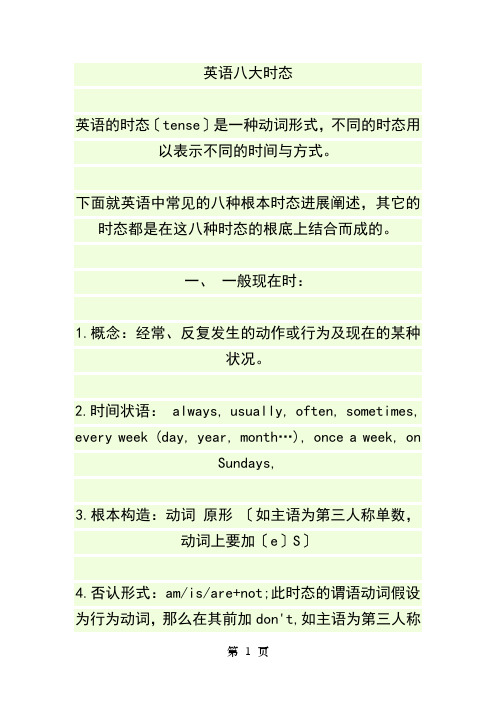
英语八大时态英语的时态〔tense〕是一种动词形式,不同的时态用以表示不同的时间与方式。
下面就英语中常见的八种根本时态进展阐述,其它的时态都是在这八种时态的根底上结合而成的。
一、一般现在时:1.概念:经常、反复发生的动作或行为及现在的某种状况。
2.时间状语: always, usually, often, sometimes, every week (day, year, month…), once a week, onSundays,3.根本构造:动词原形〔如主语为第三人称单数,动词上要加〔e〕S〕4.否认形式:am/is/are+not;此时态的谓语动词假设为行为动词,那么在其前加don't,如主语为第三人称单数,那么用doesn't,同时复原行为动词。
5.一般疑问句:把be动词放于句首;用助动词do提问,如主语为第三人称单数,那么用does,同时,复原行为动词。
6.例句:. It seldom snows here.He is always ready to help others.Action speaks louder than words.二、一般过去时:1.概念:过去某个时间里发生的动作或状态;过去习惯性、经常性的动作、行为。
2.时间状语:ago, yesterday, the day before yesterday, last week(year, night, month…), in 1989, just now, at the age of 5, one day, long long ago, once upon a time, etc.3.根本构造:be动词;行为动词4.否认形式:was/were+not;在行为动词前加didn't,同时复原行为动词。
5.一般疑问句:was或were放于句首;用助动词do的过去式did 提问,同时复原行为动词。
6.例句:She often came to help us in those days.I didn't know you were so busy.三、现在进展时:1.概念:表示现阶段或说话时正在进展的动作及行为。
8大时态的基本结构
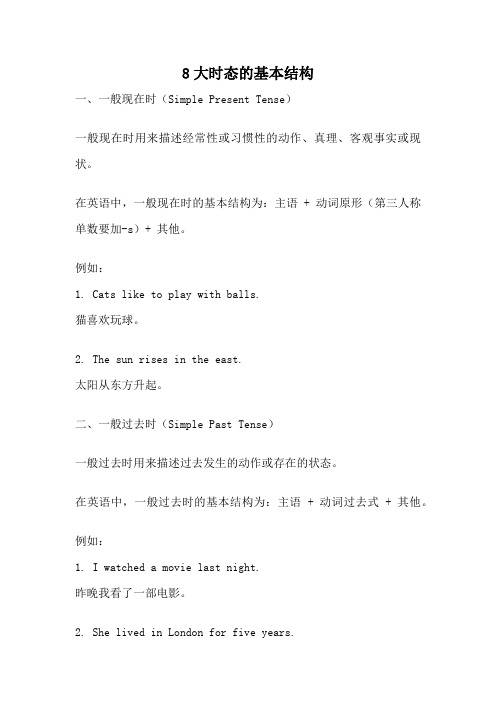
8大时态的基本结构一、一般现在时(Simple Present Tense)一般现在时用来描述经常性或习惯性的动作、真理、客观事实或现状。
在英语中,一般现在时的基本结构为:主语 + 动词原形(第三人称单数要加-s)+ 其他。
例如:1. Cats like to play with balls.猫喜欢玩球。
2. The sun rises in the east.太阳从东方升起。
二、一般过去时(Simple Past Tense)一般过去时用来描述过去发生的动作或存在的状态。
在英语中,一般过去时的基本结构为:主语 + 动词过去式 + 其他。
例如:1. I watched a movie last night.昨晚我看了一部电影。
2. She lived in London for five years.她在伦敦生活了五年。
三、一般将来时(Simple Future Tense)一般将来时用来描述将来要发生的动作或存在的状态。
在英语中,一般将来时的基本结构为:主语 + will + 动词原形 + 其他。
例如:1. We will visit our grandparents next week.下周我们将去拜访我们的祖父母。
2. He will be a doctor in the future.他将来会成为一名医生。
四、现在进行时(Present Continuous Tense)现在进行时用来描述正在进行的动作。
在英语中,现在进行时的基本结构为:主语 + am/is/are + 动词-ing + 其他。
例如:1. They are playing basketball in the park.他们正在公园里打篮球。
2. She is studying for her exam now.她现在正在为考试而学习。
五、过去进行时(Past Continuous Tense)过去进行时用来描述过去某个时间正在进行的动作。
英语中常见的八大时态(结构及用法)
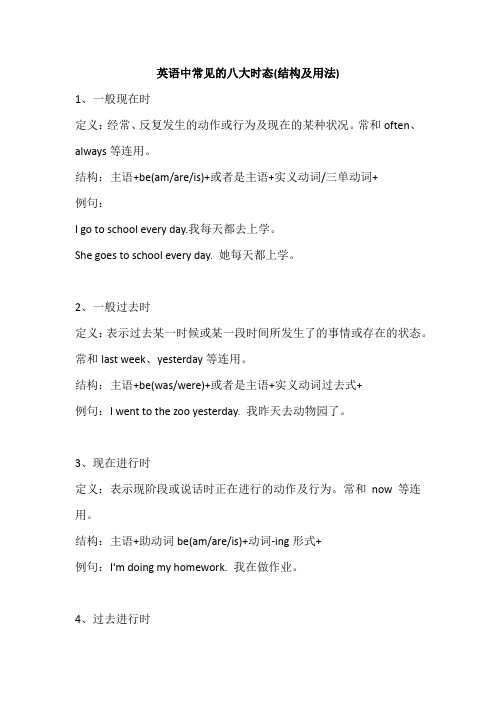
英语中常见的八大时态(结构及用法)1、一般现在时定义:经常、反复发生的动作或行为及现在的某种状况。
常和often、always等连用。
结构:主语+be(am/are/is)+或者是主语+实义动词/三单动词+例句:I go to school every day.我每天都去上学。
She goes to school every day. 她每天都上学。
2、一般过去时定义:表示过去某一时候或某一段时间所发生了的事情或存在的状态。
常和last week、yesterday等连用。
结构:主语+be(was/were)+或者是主语+实义动词过去式+例句:I went to the zoo yesterday. 我昨天去动物园了。
3、现在进行时定义:表示现阶段或说话时正在进行的动作及行为。
常和now等连用。
结构:主语+助动词be(am/are/is)+动词-ing形式+例句:I'm doing my homework. 我在做作业。
4、过去进行时定义:表示在过去某个时间点发生或进行的行为的事情。
常和at this time yesterday等或以when引导的谓语动词连用。
结构:主语+助动词be(was/were)+动词-ing形式+例句:When I got to the top of the mountain, the sun was shining. 我到达山顶时,阳光灿烂。
5、现在完成时定义:表示过去发生的动作对现在造成的影响或结果或过去的动作或状态持续到现在。
构成:主语+助动词(have/has)+动词过去分词+例句:I have lived here for more than twenty years. 我住在这儿二十多年了。
6、过去完成时定义:表示在过去某一时刻或动作以前完成了的动作,也可以说过去的时间关于过去的动作。
构成:主语+助动词(have/has)+动词过去分词+例句:She said she had never been to Paris. 她告诉我她曾去过巴黎。
英语八大时态结构
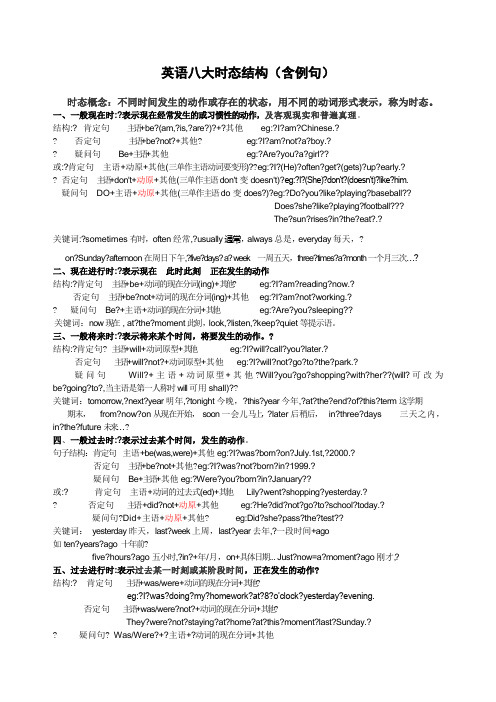
英语八大时态结构(含例句)时态概念:不同时间发生的动作或存在的状态,用不同的动词形式表示,称为时态。
一、一般现在时:?表示现在经常发生的或习惯性的动作,及客观现实和普遍真理。
结构:? 肯定句主语+be?(am,?is,?are?)?+?其他eg:?I?am?Chinese.?? 否定句主语+be?not?+其他? eg:?I?am?not?a?boy.?? 疑问句Be+主语+其他eg:?Are?you?a?girl??或:?肯定句主语+动原+其他(三单作主语动词要变形)??eg:?I?(He)?often?get?(gets)?up?early.?? 否定句主语+don't+动原+其他(三单作主语don't变doesn't)?eg:?I?(She)?don’t?(doesn’t)?like?him.疑问句DO+主语+动原+其他(三单作主语do变does?)?eg:?Do?you?like?playing?baseball??Does?she?like?playing?football???The?sun?rises?in?the?eat?.?关键词:?sometimes有时,often经常,?usually通常,always总是,everyday每天,?on?Sunday?afternoon在周日下午,?fiv e?days? a? w eek 一周五天,three?times?a?month一个月三次…?二、现在进行时:?表示现在此时此刻正在发生的动作结构:?肯定句主语+be+动词的现在分词(ing)+其他? eg:?I?am?reading?now.?否定句主语+be?not+动词的现在分词(ing)+其他eg:?I?am?not?working.?? 疑问句Be?+主语+动词的现在分词+其他eg:?Are?you?sleeping??关键词:now现在, at?the?moment此刻,look,?listen,?keep?quiet等提示语。
英语八大时态结构_含例句
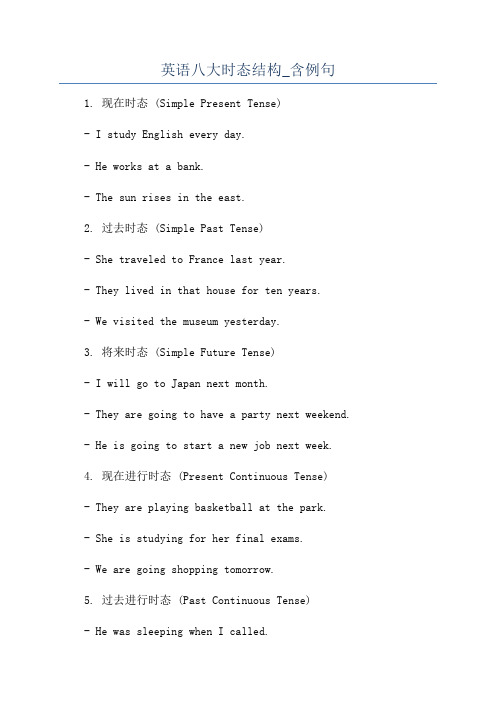
英语八大时态结构_含例句1. 现在时态 (Simple Present Tense)- I study English every day.- He works at a bank.- The sun rises in the east.2. 过去时态 (Simple Past Tense)- She traveled to France last year.- They lived in that house for ten years.- We visited the museum yesterday.3. 将来时态 (Simple Future Tense)- I will go to Japan next month.- They are going to have a party next weekend. - He is going to start a new job next week. 4. 现在进行时态 (Present Continuous Tense)- They are playing basketball at the park.- She is studying for her final exams.- We are going shopping tomorrow.5. 过去进行时态 (Past Continuous Tense)- He was sleeping when I called.- They were studying at the library all day.- We were driving to work when it started raining.6. 将来进行时态 (Future Continuous Tense)- She will be taking a vacation next month.- They will be working on a project all night.- We will be having dinner at a nice restaurant tomorrow.7. 现在完成时态 (Present Perfect Tense)- I have finished my homework.- He has seen that movie before.- They have already visited that museum.8. 过去完成时态 (Past Perfect Tense)- She had already left when we arrived.- They had finished their meal before we came.- He had already bought the tickets when I called.。
英语中八大时态的结构

英语中八大时态的结构在英语中,我们通常谈论的“八大时态”包括:一般现在时、一般过去时、一般将来时、现在进行时、过去进行时、将来进行时、现在完成时、过去完成时。
以下是这些时态的基本结构:1.一般现在时:用于描述经常发生的动作或状态,或者描述客观事实。
结构:主语+动词原形(如主语为第三人称单数,动词需加-s或-es)例句:I eat apples every day. (我每天吃苹果。
)2.一般过去时:用于描述过去发生的动作或状态。
结构:主语+动词过去式例句:I ate an apple yesterday. (我昨天吃了一个苹果。
)3.一般将来时:用于描述将来要发生的动作或状态。
结构:主语+will+动词原形例句:I will eat an apple tomorrow. (我明天将吃一个苹果。
)4.现在进行时:用于描述正在发生的动作或状态。
结构:主语+be动词(am/is/are)+动词ing形式例句:I am eating an Apple now. (我现在正在吃一个苹果。
)5.过去进行时:用于描述过去某一时刻正在发生的动作或状态。
结构:主语+be动词(was/were)+动词ing形式例句:I was eating an Apple at that time. (那个时候我正在吃一个苹果。
)6.将来进行时:用于描述将来某一时刻正在发生的动作或状态。
结构:主语+will be+动词ing形式例句:I will be eating an Apple at that time. (那个时候我将正在吃一个苹果。
)7.现在完成时:用于描述过去发生的动作对现在造成的影响或结果,或者描述从过去某一时刻开始一直持续到现在的动作或状态。
结构:主语+have/has+动词过去分词例句:I have eaten an Apple. (我已经吃了一个苹果。
)8.过去完成时:用于描述在过去某一时刻之前已经完成的动作或状态,或者在过去某一时刻之前已经对另一动作产生影响或结果的动作。
八种英语时态基本句型
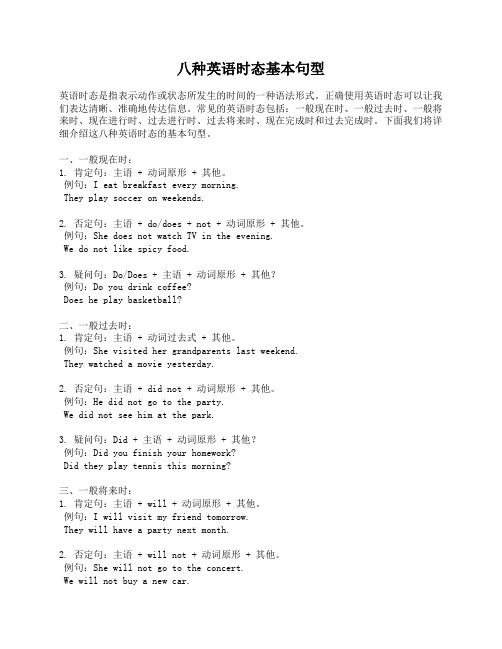
八种英语时态基本句型英语时态是指表示动作或状态所发生的时间的一种语法形式。
正确使用英语时态可以让我们表达清晰、准确地传达信息。
常见的英语时态包括:一般现在时、一般过去时、一般将来时、现在进行时、过去进行时、过去将来时、现在完成时和过去完成时。
下面我们将详细介绍这八种英语时态的基本句型。
一、一般现在时:1. 肯定句:主语 + 动词原形 + 其他。
例句:I eat breakfast every morning.They play soccer on weekends.2. 否定句:主语 + do/does + not + 动词原形 + 其他。
例句:She does not watch TV in the evening.We do not like spicy food.3. 疑问句:Do/Does + 主语 + 动词原形 + 其他?例句:Do you drink coffee?Does he play basketball?二、一般过去时:1. 肯定句:主语 + 动词过去式 + 其他。
例句:She visited her grandparents last weekend.They watched a movie yesterday.2. 否定句:主语 + did not + 动词原形 + 其他。
例句:He did not go to the party.We did not see him at the park.3. 疑问句:Did + 主语 + 动词原形 + 其他?例句:Did you finish your homework?Did they play tennis this morning?三、一般将来时:1. 肯定句:主语 + will + 动词原形 + 其他。
例句:I will visit my friend tomorrow.They will have a party next month.2. 否定句:主语 + will not + 动词原形 + 其他。
初中英语八大时态的基本结构及例句
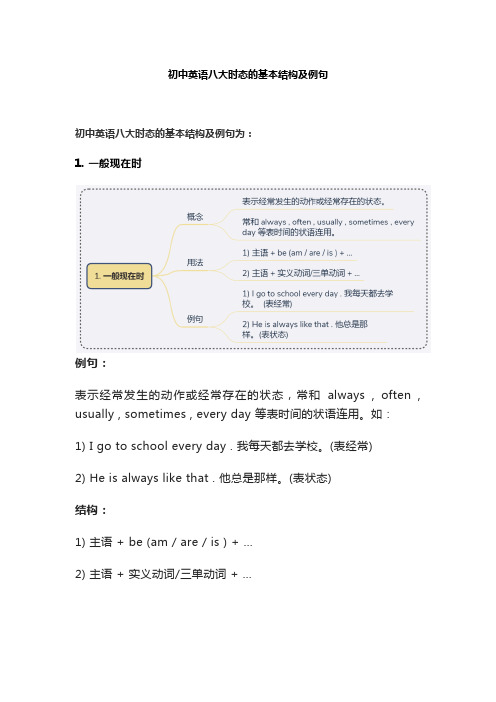
初中英语八大时态的基本结构及例句初中英语八大时态的基本结构及例句为:1. 一般现在时例句:表示经常发生的动作或经常存在的状态,常和always , often , usually , sometimes , every day 等表时间的状语连用。
如:1) I go to school every day . 我每天都去学校。
(表经常)2) He is always like that . 他总是那样。
(表状态)结构:1) 主语 + be (am / are / is ) + …2) 主语 + 实义动词/三单动词 + …2. 现在进行时例句:表示现在(说话瞬间)正在进行或发生的动作。
如:1) He is singing. 他正在唱歌。
2) They are watching TV now. 他们正在看电视。
结构:主语 + 助动词be(am/are/is) + 动词-ing形式结构3. 一般将来时例句:表示将来某个时间要发生的动作或存在的状态,也表示将来经常或反复发生的动作,常与表示将来的时间状语连用,如: tomorrow, next week, next year, in the future等。
如:1) He will go shopping tomorrow. 他明天要去购物。
2)They are going to play basketball next week. 他们下周要去打篮球。
结构:1) 主语 + 助动词will + 动原 + …2) 主语 + be going to + 动原 + ….4.一般过去时例句:1) 表示过去某个时间发生的动作或存在的状态,常和表示过去的时间状语连用。
如: yesterday , last week , in 1998 , two days ago 等。
如: I went to a movie yesterday. 我昨天去看了一场电影。
2) 也可表示过去经常或反复发生的动作。
英语八大时态结构_含例句

时态(8个):一般现在时: 经常或习惯性的动作结构: 肯定句主语+be (am, is, are ) + 其他 eg: I am Chinese.否定句主语+be not +其他 eg: I am not a boy.疑问句 Be+主语+其他 eg: Are you a girl?或: 肯定句主语+动原+其他 (三单作主语动词要变形)eg: I (He) often get (gets) up early.否定句主语+don't+动原+其他 (三单作主语don't变doesn't)eg: I (She) don’t (doesn’t) like him.疑问句 DO+主语+动原+其他 (三单作主语do变does)eg: Do (Does) you (she) like playing baseball?关键词: sometimes=at times有时,often经常, usually通常, always总是,every day每天, on Sunday afternoon在周日下午, five days a week一周五天, three times a month 一个月三次…现在进行时: 正在发生的动作结构: 肯定句主语+be+动词的现在分词(ing)+其他 eg: I am reading now.否定句主语+be not+动词的现在分词(ing)+其他 eg: I am not working.疑问句 Be +主语+动词的现在分词+其他 eg: Are you sleeping?关键词:now现在, at the moment此刻, look, listen, keep quiet等提示语.一般将来时: 将要发生的动作结构: 肯定句主语+will+动词原型+其他 eg: I will call you later.否定句主语+will not +动词原型+其他 eg: I will not go to the park.疑问句 Will +主语+动词原型+其他 Will you go shopping with her?(will 可改为be going to ,当主语是第一人称时will可用shall)关键词:tomorrow, next year明年, tonight今晚, this year今年, at the end of this term这学期期末, from now on从现在开始, soon一会儿马上, later后稍后,in three days三天之内, in the future 未来…一般过去时: 过去发生的动作强调时间句子结构:肯定句主语+be(was,were)+其他 eg: I was born on July.1st, 2000.否定句主语+be not+其他 eg: I was not born in 1999.疑问句 Be+主语+其他 eg: Were you born in January?或: 肯定句主语+动词的过去式(ed)+其他 Lily went shopping yesterday.否定句主语+did not+动原+其他 eg: He did not go to school today.疑问句 Did+主语+动原+其他eg:Did she pass the test?关键词:yesterday昨天,last week上周, last year去年, 一段时间+ago如ten years ago十年前 five hours ago五小时前, in +年/月,on+具体日期...Just now=a moment ago刚才,in the old days从前, long ago很久以前...过去进行时: 过去正在发生的动作结构: 肯定句主语+was/were+动词的现在分词+其他eg: I was doing my homework at 8 o’clock yesterday evening.否定句主语+was/were not +动词的现在分词+其他They were not staying at home at this moment last Sunday.疑问句 Was/Were + 主语+ 动词的现在分词+其他Were you sleeping when I called you last night?关键词:具体时间如:at ten o'clock yesterday morning, at this moment last Sunday上周日的这个时候...现在完成时: 过去发生的动作对现在造成的影响强调动作或其产生的结果结构:肯定句主语+have/has+动词的过去分词+其他(三单变成has)eg: This year alone, we've already planted ten thousand trees否定句主语+have/has not+动词的过去分词+其他eg: He has not arrived at home yet.疑问句 Have/Has +主语+动词的过去分词+其他eg: Have you been to China?关键词:already已经, yet还, just刚刚, ever曾经, never从不,so far目前, for +一段时间,since+过去的具体时间,this year alone今年以来,these five years alone这五年以来",in the last ten years 在过去的十年中…过去将来时:结构: 肯定句主语+ would+动原+其他 eg: I didn't know if he would come.否定句主语+ would not +动原+其他eg: They were not going to go hiking unless they finished their homework.疑问句 Would+主语+动词原型+其他 (would you like是词组一个固定搭配一般用表示礼貌的问)eg: Would you like to have a dinner with me?(would可改为was/were going to ,主语第一人称时would也可以用should)过去完成时:结构: 肯定句主语+had +动词的过去分词+其他eg: Mr. Smith died yesterday. He had been a good friend of mine.否定句主语+had not +动词的过去分词+其他eg: He said he has not been to America.疑问句 Had+主语+动词的过去分词+其他eg: Had he completed his homework by the time you got there.关键词: 句子中的两个动作都发生在过去一、一般现在时:概念:经常、反复发生的动作或行为及现在的某种状况。
英语八大时态概念
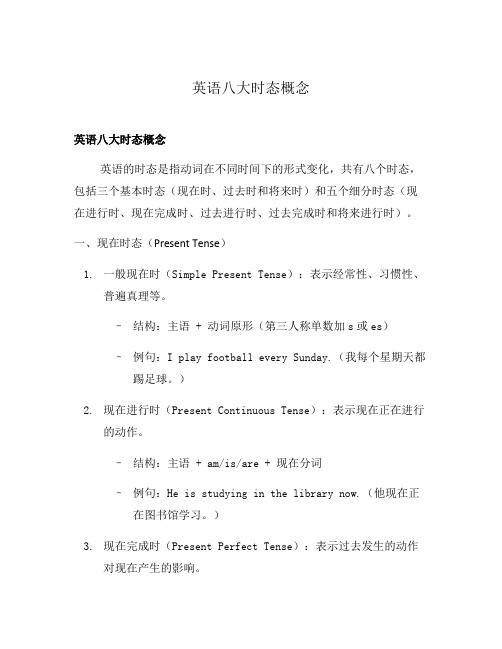
英语八大时态概念英语八大时态概念英语的时态是指动词在不同时间下的形式变化,共有八个时态,包括三个基本时态(现在时、过去时和将来时)和五个细分时态(现在进行时、现在完成时、过去进行时、过去完成时和将来进行时)。
一、现在时态(Present Tense)1.一般现在时(Simple Present Tense):表示经常性、习惯性、普遍真理等。
–结构:主语 + 动词原形(第三人称单数加s或es)–例句:I play football every Sunday.(我每个星期天都踢足球。
)2.现在进行时(Present Continuous Tense):表示现在正在进行的动作。
–结构:主语 + am/is/are + 现在分词–例句:He is studying in the library now.(他现在正在图书馆学习。
)3.现在完成时(Present Perfect Tense):表示过去发生的动作对现在产生的影响。
–结构:主语 + have/has + 过去分词–例句:I have visited Beijing many times.(我去过北京很多次。
)二、过去时态(Past Tense)1.一般过去时(Simple Past Tense):表示过去某个时间发生的动作或存在的状态。
–结构:主语 + 动词过去式–例句:She watched a movie last night.(她昨晚看了一部电影。
)2.过去进行时(Past Continuous Tense):表示过去某个时间正在进行的动作。
–结构:主语 + was/were + 现在分词–例句:They were playing basketball at 8 o’clock yesterday evening.(昨晚8点他们正在打篮球。
)3.过去完成时(Past Perfect Tense):表示过去某一时间或动作发生在另一过去时间之前。
英语八大时态整理归纳
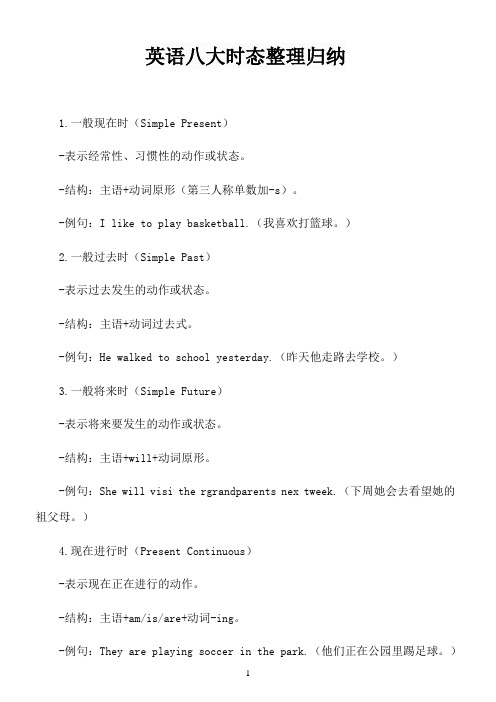
英语八大时态整理归纳1.一般现在时(Simple Present)-表示经常性、习惯性的动作或状态。
-结构:主语+动词原形(第三人称单数加-s)。
-例句:I like to play basketball.(我喜欢打篮球。
)2.一般过去时(Simple Past)-表示过去发生的动作或状态。
-结构:主语+动词过去式。
-例句:He walked to school yesterday.(昨天他走路去学校。
)3.一般将来时(Simple Future)-表示将来要发生的动作或状态。
-结构:主语+will+动词原形。
-例句:She will visi the rgrandparents nex tweek.(下周她会去看望她的祖父母。
)4.现在进行时(Present Continuous)-表示现在正在进行的动作。
-结构:主语+am/is/are+动词-ing。
-例句:They are playing soccer in the park.(他们正在公园里踢足球。
)5.过去进行时(Past Continuous)-表示过去某一时间正在进行的动作。
-结构:主语+was/were+动词-ing。
-例句:I was studying when she called me.(她给我打电话的时候,我正在学习。
)6.现在完成时(Present Perfect)-表示过去某个时间发生的动作对现在造成的影响。
-结构:主语+have/has+过去分词。
-例句:We have finished our homework.(我们已经完成了作业。
)7.过去完成时(Past Perfect)-表示过去某一时间之前已经发生的动作。
-结构:主语+had+过去分词。
-例句:He had already left when I arrived.(我到达时他已经离开了。
)8.将来完成时(Future Perfect)-表示将来某个时间之前已经完成的动作。
八大时态例句
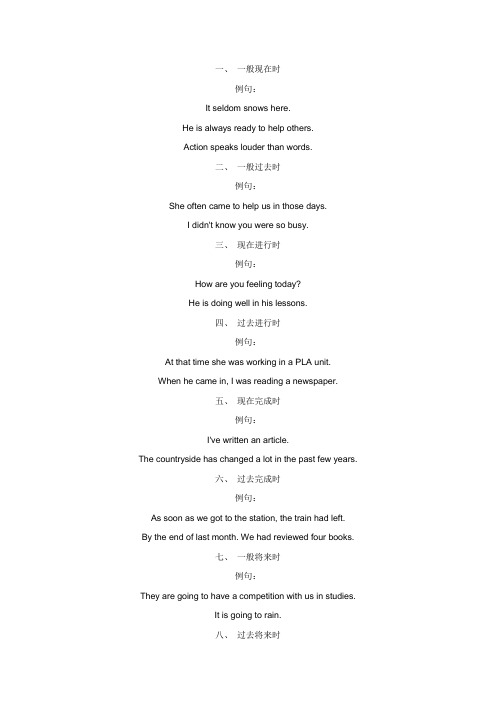
一、一般现在时例句:It seldom snows here.He is always ready to help others.Action speaks louder than words.二、一般过去时例句:She often came to help us in those days.I didn't know you were so busy.三、现在进行时例句:How are you feeling today?He is doing well in his lessons.四、过去进行时例句:At that time she was working in a PLA unit.When he came in, I was reading a newspaper.五、现在完成时例句:I've written an article.The countryside has changed a lot in the past few years.六、过去完成时例句:As soon as we got to the station, the train had left. By the end of last month. We had reviewed four books.七、一般将来时例句:They are going to have a competition with us in studies.It is going to rain.八、过去将来时例句:He said he would go to Beijing the next day.I asked who was going there.九.将来完成时例句:By the time you get back,great changes will have taken place in this area.初中阶段只需要掌握以上这些。
英语八大时态每种形式的例句
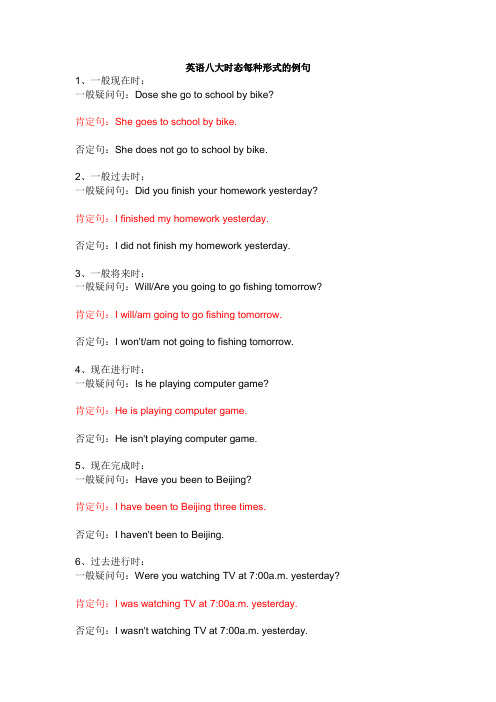
英语八大时态每种形式的例句1、一般现在时:一般疑问句:Dose she go to school by bike?肯定句:She goes to school by bike.否定句:She does not go to school by bike.2、一般过去时:一般疑问句:Did you finish your homework yesterday?肯定句:I finished my homework yesterday.否定句:I did not finish my homework yesterday.3、一般将来时:一般疑问句:Will/Are you going to go fishing tomorrow?肯定句:I will/am going to go fishing tomorrow.否定句:I won't/am not going to fishing tomorrow.4、现在进行时:一般疑问句:Is he playing computer game?肯定句:He is playing computer game.否定句:He isn't playing computer game.5、现在完成时:一般疑问句:Have you been to Beijing?肯定句:I have been to Beijing three times.否定句:I haven't been to Beijing.6、过去进行时:一般疑问句:Were you watching TV at 7:00a.m. yesterday? 肯定句:I was watching TV at 7:00a.m. yesterday.否定句:I wasn't watching TV at 7:00a.m. yesterday.7、过去完成时:一般疑问句:Had you finished your homework when you watched the TV. 肯定句:I had already finished my homework when I watched the TV.否定句:I hadn't finished my homework yet when I watched the TV.8、过去将来时:一般疑问句:I didn't know whether he would help me.肯定句:He said he would help me.否定句:He said he wouldn't help me.。
英语八个时态结构

英语八个时态结构
1. 简单现在时(Simple Present T ense):主语+动词原形
例如:She drinks coffee every morning.
2. 现在进行时(Present Continuous Tense):主语+am/is/are+动名词例如:He is studying for his exams right now.
3. 简单过去时(Simple Past Tense):主语+动词过去式
例如:They visited Paris last year.
4. 过去进行时(Past Continuous Tense):主语+was/were+动名词
例如:I was sleeping when you called me.
5. 现在完成时(Present Perfect Tense):主语+have/has+动词过去分词例如:She has already finished her homework.
6. 过去完成时(Past Perfect Tense):主语+had+动词过去分词
例如:By the time I arrived, they had already left.
7. 将来进行时(Future Continuous Tense):主语+will be+动名词
例如:This time next week, I will be studying for my exams.
8. 将来完成时(Future Perfect Tense):主语+will have+动词过去分词例如:By the end of the year, I will have finished my project.。
英语的8大时态构成及造句
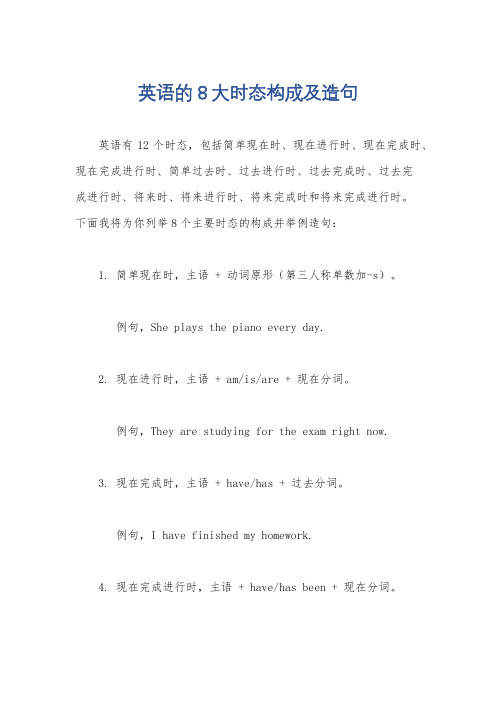
英语的8大时态构成及造句英语有12个时态,包括简单现在时、现在进行时、现在完成时、现在完成进行时、简单过去时、过去进行时、过去完成时、过去完成进行时、将来时、将来进行时、将来完成时和将来完成进行时。
下面我将为你列举8个主要时态的构成并举例造句:1. 简单现在时,主语 + 动词原形(第三人称单数加-s)。
例句,She plays the piano every day.2. 现在进行时,主语 + am/is/are + 现在分词。
例句,They are studying for the exam right now.3. 现在完成时,主语 + have/has + 过去分词。
例句,I have finished my homework.4. 现在完成进行时,主语 + have/has been + 现在分词。
例句,He has been working here for five years.5. 简单过去时,主语 + 动词过去式。
例句,We watched a movie last night.6. 过去进行时,主语 + was/were + 现在分词。
例句,She was reading a book when I called her.7. 过去完成时,主语 + had + 过去分词。
例句,They had already left when I arrived.8. 过去完成进行时,主语 + had been + 现在分词。
例句,By the time I got there, they had been waiting for over an hour.希望以上例句能够帮助你更好地理解这些时态的构成和用法。
英语八大时态例句及解析
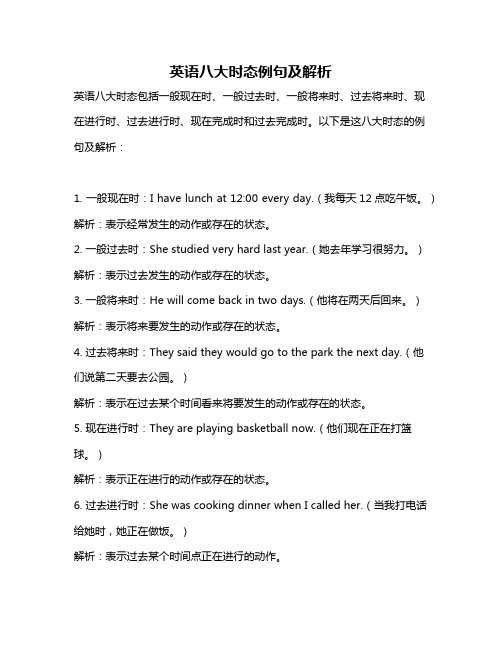
英语八大时态例句及解析英语八大时态包括一般现在时、一般过去时、一般将来时、过去将来时、现在进行时、过去进行时、现在完成时和过去完成时。
以下是这八大时态的例句及解析:1. 一般现在时:I have lunch at 12:00 every day.(我每天12点吃午饭。
)解析:表示经常发生的动作或存在的状态。
2. 一般过去时:She studied very hard last year.(她去年学习很努力。
)解析:表示过去发生的动作或存在的状态。
3. 一般将来时:He will come back in two days.(他将在两天后回来。
)解析:表示将来要发生的动作或存在的状态。
4. 过去将来时:They said they would go to the park the next day.(他们说第二天要去公园。
)解析:表示在过去某个时间看来将要发生的动作或存在的状态。
5. 现在进行时:They are playing basketball now.(他们现在正在打篮球。
)解析:表示正在进行的动作或存在的状态。
6. 过去进行时:She was cooking dinner when I called her.(当我打电话给她时,她正在做饭。
)解析:表示过去某个时间点正在进行的动作。
7. 现在完成时:I have finished my homework.(我已经完成了作业。
)解析:表示已经完成的动作或存在的状态,强调对现在的影响。
8. 过去完成时:They had left before we arrived.(在我们到达之前,他们已经离开了。
)解析:表示在过去的某个时间之前已经完成的动作。
希望能够帮助到您。
如需更多详细信息,建议查阅英语语法书籍或咨询英语教师。
八个时态的句型结构

八个时态的句型结构1. Simple Present Tense (一般现在时):Subject + Verb (s/es) + Object例如:She sings beautifully. (她唱得很优美。
)2. Present Continuous Tense (现在进行时):Subject + am/is/are + Verb-ing + Object例如:They are playing basketball. (他们正在打篮球。
)3. Present Perfect Tense (现在完成时):Subject + has/have + Past Participle + Object例如:I have finished my homework. (我已经完成了我的作业。
)4. Simple Past Tense (一般过去时):Subject + Verb (ed) + Object例如:He visited Paris last summer. (他去年夏天参观了巴黎。
)5. Past Continuous Tense (过去进行时):Subject + was/were + Verb-ing + Object例如:They were playing volleyball when it started raining. (下雨时他们正在打排球。
)6. Past Perfect Tense (过去完成时):Subject + had + Past Participle + Object例如:She had already left before I arrived. (在我到达之前她已经离开了。
)7. Simple Future Tense (一般将来时):Subject + will/shall + Verb + Object例如:They will visit their grandparents next weekend. (他们下周末会去看望他们的祖父母。
- 1、下载文档前请自行甄别文档内容的完整性,平台不提供额外的编辑、内容补充、找答案等附加服务。
- 2、"仅部分预览"的文档,不可在线预览部分如存在完整性等问题,可反馈申请退款(可完整预览的文档不适用该条件!)。
- 3、如文档侵犯您的权益,请联系客服反馈,我们会尽快为您处理(人工客服工作时间:9:00-18:30)。
时态(8个):一般现在时: 经常或习惯性的动作结构: 肯定句主语+be (am, is, are ) + 其他 eg: I am Chinese.否定句主语+be not +其他 eg: I am not a boy.疑问句 Be+主语+其他 eg: Are you a girl?或: 肯定句主语+动原+其他 (三单作主语动词要变形)eg: I (He) often get (gets) up early.否定句主语+don't+动原+其他 (三单作主语don't变doesn't)eg: I (She) don’t (doesn’t) like him.疑问句 DO+主语+动原+其他 (三单作主语do变does)eg: Do (Does) you (she) like playing baseball?关键词: sometimes=at times有时,often经常, usually通常, always总是,every day每天, on Sunday afternoon在周日下午, five days a week一周五天, three times a month 一个月三次…现在进行时: 正在发生的动作结构: 肯定句主语+be+动词的现在分词(ing)+其他 eg: I am reading now.否定句主语+be not+动词的现在分词(ing)+其他 eg: I am not working.疑问句 Be +主语+动词的现在分词+其他 eg: Are you sleeping?关键词:now现在, at the moment此刻, look, listen, keep quiet等提示语.一般将来时: 将要发生的动作结构: 肯定句主语+will+动词原型+其他 eg: I will call you later.否定句主语+will not +动词原型+其他 eg: I will not go to the park.疑问句 Will +主语+动词原型+其他 Will you go shopping with her?(will 可改为be going to ,当主语是第一人称时will可用shall)关键词:tomorrow, next year明年, tonight今晚, this year今年, at the end of this term这学期期末, from now on从现在开始, soon一会儿马上, later后稍后,in three days三天之内, in the future 未来…一般过去时: 过去发生的动作强调时间句子结构:肯定句主语+be(was,were)+其他 eg: I was born on July.1st, 2000.否定句主语+be not+其他 eg: I was not born in 1999.疑问句 Be+主语+其他 eg: Were you born in January?或: 肯定句主语+动词的过去式(ed)+其他 Lily went shopping yesterday.否定句主语+did not+动原+其他 eg: He did not go to school today.疑问句 Did+主语+动原+其他eg:Did she pass the test?关键词:yesterday昨天,last week上周, last year去年, 一段时间+ago如ten years ago十年前 five hours ago五小时前, in +年/月,on+具体日期...Just now=a moment ago刚才,in the old days从前, long ago很久以前...过去进行时: 过去正在发生的动作结构: 肯定句主语+was/were+动词的现在分词+其他eg: I was doing my homework at 8 o’clock yesterday evening.否定句主语+was/were not +动词的现在分词+其他They were not staying at home at this moment last Sunday.疑问句 Was/Were + 主语+ 动词的现在分词+其他Were you sleeping when I called you last night?关键词:具体时间如:at ten o'clock yesterday morning, at this moment last Sunday上周日的这个时候...现在完成时: 过去发生的动作对现在造成的影响强调动作或其产生的结果结构:肯定句主语+have/has+动词的过去分词+其他(三单变成has)eg: This year alone, we've already planted ten thousand trees否定句主语+have/has not+动词的过去分词+其他eg: He has not arrived at home yet.疑问句 Have/Has +主语+动词的过去分词+其他eg: Have you been to China?关键词:already已经, yet还, just刚刚, ever曾经, never从不,so far目前, for +一段时间,since+过去的具体时间,this year alone今年以来,these five years alone这五年以来",in the last ten years 在过去的十年中…过去将来时:结构: 肯定句主语+ would+动原+其他 eg: I didn't know if he would come.否定句主语+ would not +动原+其他eg: They were not going to go hiking unless they finished their homework.疑问句 Would+主语+动词原型+其他 (would you like是词组一个固定搭配一般用表示礼貌的问)eg: Would you like to have a dinner with me?(would可改为was/were going to ,主语第一人称时would也可以用should)过去完成时:结构: 肯定句主语+had +动词的过去分词+其他eg: Mr. Smith died yesterday. He had been a good friend of mine.否定句主语+had not +动词的过去分词+其他eg: He said he has not been to America.疑问句 Had+主语+动词的过去分词+其他eg: Had he completed his homework by the time you got there.关键词: 句子中的两个动作都发生在过去一、一般现在时:概念:经常、反复发生的动作或行为及现在的某种状况。
时间状语:often,usually,always,sometimes,every week(day,year,month...),once a week,on Sundays,etc.基本结构:①be动词;②行为动词否定形式:① am /is /are +not;②此时态的谓语动词若为行为动词,则在其前加don't,如主语为第三人称单数,则用doesn't,同时还原行为动词。
一般疑问句:①把be动词放于句首;②用助动词 do提问,如主语为第三人称单数,则用does,同时,还原行为动词。
二、一般过去时:概念:过去某个时间里发生的动作或状态;过去习惯性、经常性的动作、行为。
时间状语:ago,yesterday,the day before yesterday,last week(year,night,month...),in 1989,just now,at the age of 5,one day,long long ago,once upon a time,etc.基本结构:①be动词;②行为动词否定形式:① was/were +not;②在行为动词前加didn't,同时还原行为动词。
一般疑问句:①was或were放在句首;②用助动词do的过去式did提问,同时还原行为动词。
三、现在进行时:概念:表示现阶段或说话时正在进行的动作及行为。
时间状语:now,at this time,these days,etc.基本结构:am/is/are +doing否定形式:am/is/are +not+doing一般疑问句:把be动词放在句首四、过去进行时:概念:表示过去某段时间或某一时刻正在发生或进行的行为或动作。
时间状语:at this time yesterday,at that time或以when引导的谓语动词是一般过去时的时间状语等。
基本结构:was/were +doing否定形式:was/were +not+doing一般疑问句:把was或were放在句首五、现在完成时:概念:过去发生或已经完成的动作对现在造成的影响或结果,或从过去已经开始,持续到现在的动作或状态。
时间状语:recently,lately,since...,for...,in the past few years,etc.基本结构:have/has +done否定形式:have/has +not+done一般疑问句:have/has放于句首六、过去完成时:概念:以过去某一时间为标准,在此以前发生的动作或行为,或在过去某动作之前完成的行为,即“过去的过去”。
时间状语:before,by the end of last year(term,month...),etc.基本结构:had +done否定形式:had +not+done一般疑问句:had放于句首七、一般将来时:概念:表示将要发生的动作或存在的状态及打算、计划或准备做某事。
时间状语:tomorrow,next day(week,month,year....),soon,in a few minutes,by...,the day after tomorrow,etc.基本结构:①am/is/are/going to +do;②will/shall+do否定形式:①am/is/are +not+going to +do;② will/shall+not+do一般疑问句:①be放于句首;② will/shall提到句首八、过去将来时:概念:立足于过去某一时刻,从过去看将来,常用于宾语从句中。
